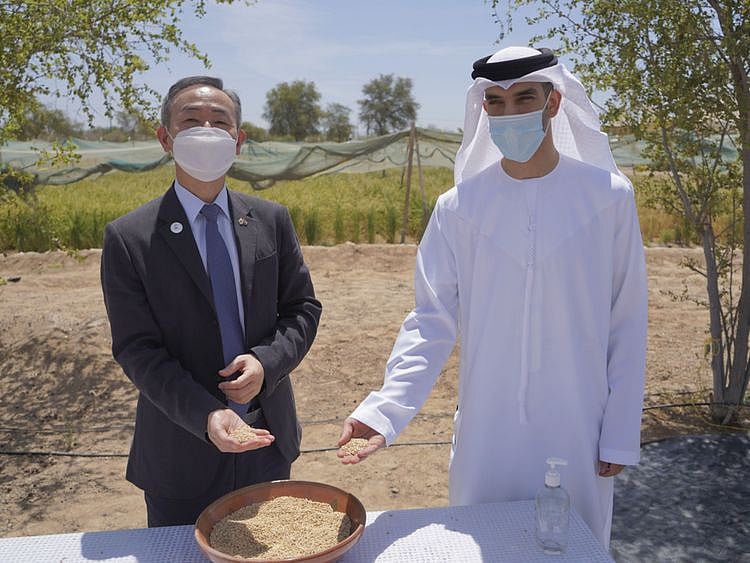UAE grows its own rice in game-changing sustainability project
763-kg produced per 1,000 square metre in an Al Dhaid farm in Sharjah

Dubai: Rice is being grown at a farm in Sharjah and the UAE’s Ministry of Climate Change and Environment (MoCCAE) has announced it has the potential to shape the future of agriculture not just in the country but also regionally.
The pioneering project was carried out at the Ministry’s research centre in Al Dhaid, Sharjah. Seeds were sowed in November last year and harvested in three stages last month, after completing a growth cycle of 180 days.
To facilitate the monitoring and recording of results, the plot was divided into three blocks. The first block was harvested on May 5, the second block on May 10, and the third block on May 30.
The pilot phase showed positive results, following a yield of 763-kg of rice per 1,000 square metres.
The types of rice grown were the short-grained Asemi (Japonica), which is extensively cultivated and consumed in China, Japan, and Korea; and the long-grained FL478 (Indica) variety, more popularly known as basmati.
According to MoCCAE, the project experts selected the two rice varieties because of their ability to tolerate heat, salinity, and poor soil conditions.
The research team has installed an underground drip irrigation system to address the challenge of water scarcity and also to reduce the cost and the amount of water used for the crops.
However, the harvested rice will only be put to commercial use after the completion of testing to ensure its compliance with standard specifications.
From arid to arable land
MoCCAE Minister Dr Thani bin Ahmed Al Zeyoudi said the success of the pilot phase of the research program conducted in partnership with the Rural Development Administration (RDA) of the Republic of Korea and the United Arab Emirates University (UAEU) proved the possibility of cultivating rice in the desert.
“The innovative venture is the first endeavour of its kind in the Middle East,” Al Zeyoudi said in a statement sent to Gulf News.
“If successful on a large scale, this groundbreaking project has the potential to shape the future of agriculture, as it can be replicated in other arid regions,” he emphasised.
“Rice is one of the most important foods that is consumed on a daily basis in this region. We are focusing on driving innovation and exploring agritech in growing the crops that are in high demand locally. We seek to make the most of our resources and find the crops and methods that are suitable for our desert climate. In this process, we are exploring and adopting more innovative solutions in every phase,” he added.
The Ambassador of the Republic to Korea to the UAE, Kwon Yongwoo, said: “The Korean Government and Embassy are delighted that the cooperation of the two countries in the agricultural area has seen the first tangible success, especially during this difficult situation due to the COVID-19 pandemic.
“Korea has a long experience and cutting-edge technologies in the field of agriculture and food security, which we are ready to share with the UAE,” he added.
The Korean ambassador also expressed the intention of the Korean Government to continue to work closely with MoCCAE on the second phase of the rice cultivation program, which will focus more intensively on water-saving technologies to ensure sustainability.
He added the Korean Government will also cooperate with the UAE in building smart greenhouse projects and control of pests in date palms.
Sign up for the Daily Briefing
Get the latest news and updates straight to your inbox
Network Links
GN StoreDownload our app
© Al Nisr Publishing LLC 2026. All rights reserved.